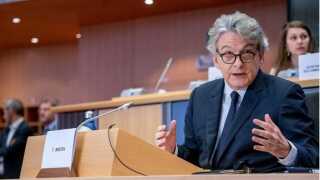STC, e& – the new name of Etisalat – Zain Group, Batelco, du, and Omantel signed a Memorandum of Understanding at MWC last week, which in addition to the carbon footprint pledge, aims to "accelerate and tighten cooperation to preserve and protect the environment".
Jennifer Suleiman, Zain Group chief sustainability officer, said: “Climate change and reducing our carbon footprint are material to Zain's strategic objectives across our markets. This collaboration between like-minded operators is a transformative step towards advancing sustainability across the GCC and is in line with our sustainability ambition of providing meaningful connectivity leading to systemic change.”
It isn't the first sustainability pledge for any of the six, however, it will see them assess the impact of their operations in more detail and "highlight the importance" of collaboration in this area.
Of the six, STC said last year that it has developed a Sustainable Energy Framework designed to take the business through to 2030. Group CEO Olayan M. Alwetaid said at the time the focus will fall on "better energy management, monitoring, and reporting – with clear benchmarks and KPIs", although specific figures were not released.
In its second sustainability report, published in August of last year, "revealed its efforts to" decrease water use by 40% from 509,768m3 in 2019 to 303,789m3 in 2020; and reduce the total electricity consumption by 16%, gasoline by 18%, and the use of paper documents in procurement by 100%.
Alwetaid added: "We will also develop renewable energy generation at our campus and facilities throughout Saudi Arabia. What’s more we will ensure energy efficiency in our existing buildings and assets and finally new buildings will be designed and built with energy-saving features.”
Zain's last sustainability report – its 10th – was published in March 2021 and highlighted the firm's 2020-2025 Corporate Sustainability Strategy. It detailed how Zain "took major steps in reducing its emissions", installing more than 370 outdoor base station and power station solutions, 54 smaller sized generators, and upgraded 266 sites "to use more efficient DC power solutions across all markets".
The group also has a tree planting programme, however, its reported power use is divided into two categories to reflect the "low influence and control" Zain has over the energy sources for its base station operations, data centres and core sites. Due to this, its CO2 emission reduction range was set at 5-10% by 2022.
Over in Bahrian, Batelco inaugurated the Batelco Solar Park in late 2021, in line with Bahrain's target to reach "zero-carbon neutrality" by 2060.
The UAE's net zero carbon target has been set for 2050 and, in line with that, e&
During Expo2020, which concludes in less than a month, e& has worked with Ericsson to highlight ICT's role in the target.
On the suitability of its own operations, Etisalat's last sustainability report was published in 2020, which detailed how "environmental management" is one of five pillars in its sustainability framework, alongside marketplace and customers , accountable business practices, connecting communities and our people.
In 2020, Etisalat said it saved 9,404,362 kilowatt-hours (kWh) of electricity, while displacing 5,548 tonnes of Carbon Dioxide (CO2) and saving 1,191 trees or 12,330 barrels of oil.
As much as 40% of waste generated was recycled and total water consumption was reduced by 11%.
du's last sustainability report was also published in 2020 and detailed the company's gains on hybrid generators – which at that point had resulted in diesel savings of approximately 1.79 million litres/year, or a carbon footprint reduction of 4,540 tonnes/year, according to du's calculations – and solar energy.
On solar, du had 30 active sites at the time, resulting in a total diesel saving of approximately 2.4 million litres, or a carbon footprint reduction of 6,000 tonnes.
Lastly, over at Omantel, last year its HQ was awarded LEED certification by the United States Green Building Council. With a score of 86 points – out of a potential 110 – it acehived Platinum status, the first building in Oman to do so.









